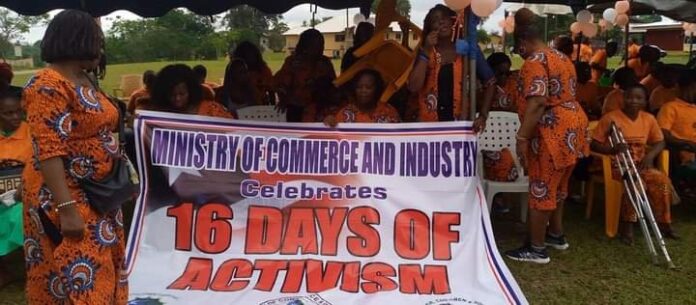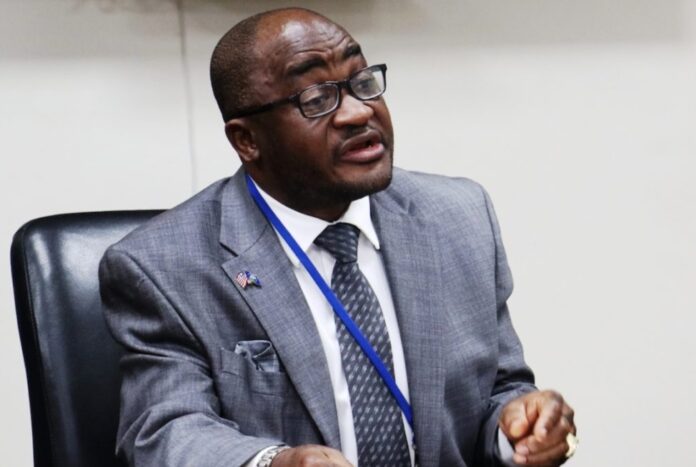On Thursday, 25 November 2021, Liberia joined the rest of the world in officially launching this year’s version of the 16 Days of Activism Against Gender-Based Violence, with resounding calls by multiple speakers for the pressing need for Liberians to act concertedly and immediately in bringing to halt threats posed by gender-based violence.
The 16 Days of Activism Against Gender-Based Violence, an international campaign, is commemorated annually to reinforce, elevate and collaborate efforts intended to put an end to all forms of violence against women and girls, is a global campaign that each year, runs from 25 November, which marks International Day for the Elimination of Violence against Women; to 10 December, International Human Rights Day.
This year, the 16 Days’ campaign is being observed under a global theme: “End Violence Against Women Now!” With
Liberia commemorating same on the local front under a national theme: “Enough is Enough! Let’s Act Now To End Violence Against Women, Girls, Children and Other Marginalized Groups.”
At a program held in the City of Kakata, Margibi County, marking Liberia’s official launch of this year’s 16 Days of Activism, calls by several speakers, were made for all to make strides to nip in the bud, violence against women and girls – and one of such speakers, the country’s Minister of Commerce and Industry, Mawine G. Diggs, stressed that following centuries of existence, now was the time to go beyond workshops and conferences, PowerPoint presentations and email exchanges, speeches and rallies to take firm and concrete actions to end Sexual and Gender-Based Violence (SGBV) against women, girls and marginalized groups.
She explicitly emphasized that Liberia, as a nation that has historically taken the lead on many fronts, its people cannot waiver or lag behind in these fights and efforts as they have always stood as an example for many to follow – therefore, urging that as Liberia celebrates its upcoming bicentennial, Liberians do so keeping in mind that the future of women, girls and other marginalized groups of Liberia rests on the decisions they make, the action they take and the goals they set.
Additionally, Diggs called on the Sexual and Gender-Based Violence Unit of the Ministry of Justice to remain vocal in the fight against SGBV in Liberia and further encourage a closer collaboration amongst the Sexual and Gender-Based Violence Unit of the Ministry of Justice, the Women and Children Protection Unit of the Liberia National Police, other State security institutions, and the Ministry of Gender, Children and Social Protection, noting that it is critical as all collectively work to protect, support, advocate and assist all citizens within the bailiwick of Liberia.
Like Commerce Minister Diggs, Deputy Minister of Gender, Children and Social Protection, Hassan Kanneh called on Liberians to join the campaign and engage every sector ensuring that inhumane acts of violence stops or must end now.
Kanneh urged that perpetrators of violence against children and women not be sheltered, warning that absolutely there should be no impunity, condoning, tolerating, resignation and compromises or excuses in the fight against violence against women and children, and that Liberians must work together to ensure that women and girls are given equal opportunities as well as boys to go to school and realize their full potential.
For his part, UN Resident Coordinator, Niels Scott, while applauded the Government and people of Liberia, civil society organizations, the media, private sector and other key stakeholders for amplifying their voices and taking appropriate actions in ensuring the protection of women and girls, boys and men from various forms of violence that continue to creep in the Liberian society unabated, acknowledged that while several gains have been aimed at ending violence against women and girls in Liberia, a lot more still need to be done.
He specifically stressed the need to strengthen primary prevention efforts that he said are transformative in nature and redefine power relations that have often put women and girls in a vulnerable situation at family, community, and institutional levels.
Mr. Scott pointed out that response systems need to be strengthened coupled with timely redress of cases to reduce future crimes of a similar nature.
In a joint statement from the embassies of France, Ireland, Germany, Sweden, United Kingdom, United States of America, ECOWAS Commission and the delegation of the European Union, read by Swedish Ambassador Urban Sjostrom, Liberia’s international partners made it clear that now was the time for all and sundry to act now, stating, “We must act now, we must act together and we must end
Gender-based violence.”
The Swedish envoy then called for improved data collection to enhance the collective understanding of the demographics of the problem, urging that Liberia invests in evidence-based violence prevention programs such as school-based interventions with community outreach, combining economic empowerment and gender training, and community mobilization to change social norms.
In lieu of the foregoing, we from SMART NEWS online publication, an institution with vested interest in issues that affect whether positively or negatively, women and girls, as well as other marginalized groups, can do none less but concord with all the speakers at this year’s official launch of the16 Days of Activism Against Gender-Based Violence that like never before, now is the time to nip in the bud, the dehumanizing acts of violence against women and girls, as well as against other marginalized groups in the Liberian society.







